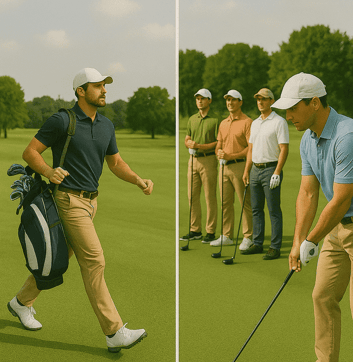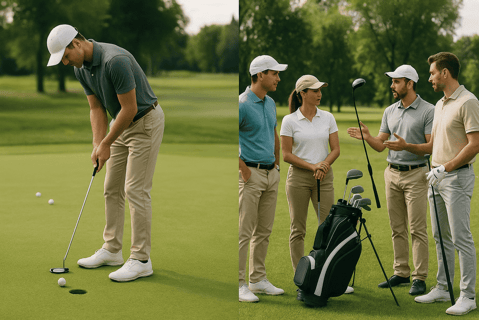Golfing Solo vs. Group Play: Why You Should Try Both
Explore the benefits of Golfing Solo vs. Group Play to improve your game, focus your mind, and enjoy golf in new ways—discover why trying both is key.
GOLF LIFESTYLE
Golfing Solo vs. Group Play: Why You Should Try Both


Golf is a versatile sport that can be enjoyed alone or with others. Both solo and group play offer unique benefits that can enhance your game and overall experience. In this article, we'll explore the advantages of each style, how they differ, and why you should consider trying both. Whether you're looking to improve your swing mechanics, enjoy the camaraderie of friends, or simply find a breather from life, understanding the benefits of solo and group golf can help you make the most of your time on the course.
Benefits of Solo Golfing
Playing golf alone provides a range of opportunities that can significantly improve your game and personal enjoyment. Here are some key benefits:
On-Course Practice Opportunities


Solo golf allows you to turn the course into your personal practice ground. Without the pressure of holding up other players, you can take extra shots, experiment with different club selections, or even replay a challenging hole. For instance, if you struggle with a particular bunker shot or approach shot, you can take the time to practice it multiple times, refining your technique without worrying about the pace of play.
Self-Paced Play


When you golf alone, you control the rhythm of the game. You can play quickly if you're short on time, or take a leisurely approach to enjoy the scenery. This flexibility is especially valuable during late afternoons or when you have a tight schedule. You can even choose to play a shorter round, focusing on specific holes like the 6th or 12th hole, or challenge yourself on the 18th hole without feeling rushed.
Enhanced Concentration and Focus


Without the distractions of fellow golfers, solo play allows for deeper concentration. You can focus entirely on your swing, the feel of each shot, and the nuances of the course. This heightened focus can lead to better performance, especially on challenging holes where precision is key. Many golfers find that solo rounds help them achieve a state of flow, where they are fully immersed in the game.
Experimentation with Strategies


Solo golf provides the perfect opportunity to try new strategies without the pressure of competition. You can test different club options, like using a driver off the tee versus a safer iron, or experiment with your approach to difficult holes. This freedom to experiment can lead to valuable insights and improvements in your game.
Focus on Swing Mechanics


Playing alone allows you to concentrate on your swing mechanics. You can take extra practice swings, work on your tempo, or even address specific issues like bad swing sequencing. Without the need to keep up with a group, you can take the time to analyze each stroke, making adjustments as needed. This focused practice can be particularly beneficial for amateur golfers looking to refine their skills.
Benefits of Group Play
While solo golf offers personal growth and skill development, group play brings its own set of advantages, particularly in terms of social interaction and motivation.
Shared Experiences


Golfing with friends or fellow players creates shared memories that can strengthen bonds. Whether it's laughing over a bad shot, celebrating a great tee shot, or simply enjoying the beauty of the course together, these moments make the game more enjoyable. Group play turns golf into a social game, where the experience is as much about the people as it is about the sport.
Friendly Competition
Playing with others adds a layer of friendly competition that can be both motivating and fun. Whether you're competing for the lowest score or just trying to outdrive your golf buddy, this rivalry can push you to perform better. Events like best-ball or "worst-ball" golf can add variety and excitement to the game, making each round feel fresh and engaging.
Building Camaraderie


Golf is known for fostering camaraderie, and group play is the perfect way to build relationships. Whether you're playing with a regular circle of friends or meeting new people through random pairings, the time spent together on the course can lead to lasting friendships. The social interactions during a round, whether discussing club selection or sharing tips, enhance the overall experience.
Motivation Through Rivalry


Competing against friends or other players can be a powerful motivator. Seeing others hit great shots or achieve low scores can inspire you to improve your own game. This friendly rivalry can push you to practice more, focus harder, and ultimately become a better golfer.
Support from Other Players


Group play provides a support system that can be invaluable, especially for amateur golfers. More experienced players can offer advice on swing mechanics, course management, or even mental strategies. This mentorship can accelerate your learning curve and make the game more enjoyable.
Comparing Solo and Group Golf Experiences
Understanding the differences between solo and group play can help you decide which style suits your needs on any given day.
Differences in Game Pace


Solo play is typically faster since you're not waiting for others to take their shots. You can complete a round in record time, especially if you're playing speed golf or focusing on efficiency. In contrast, group play, particularly with 3-4 people, can be slower due to the additional players and social interactions. While this slower pace can be relaxing, it may not be ideal if you're short on time.
Impact on Skill Development


Solo golf allows for focused practice sessions, where you can work on specific aspects of your game, like swing mechanics or approach shots. Group play, on the other hand, offers opportunities to learn from others. Watching your fellow golfers handle different situations or receiving tips on club selection can provide valuable insights that you might miss when playing alone.
Variations in Game Dynamics
In solo play, the game is entirely about your performance. You set your own goals, whether it's beating your personal best or mastering a particular hole. Group play introduces team dynamics, especially in formats like scrambles or best-ball events, where collaboration and strategy come into play. This can add an extra layer of excitement and challenge.
Contrast in Social Interaction
Solo golf is a quiet, introspective experience, offering a chance for self-reflection and mental clarity. Group play is inherently social, filled with conversation, laughter, and camaraderie. Depending on your mood or goals, you might prefer one over the other. For instance, if you're looking for a breather from life, solo golf might be the perfect escape, while group play is ideal for social outings.
How Solo Golfing Enhances Personal Growth
Beyond improving your golf game, solo play can contribute to personal development in meaningful ways.
Opportunities for Self-Reflection


Golfing alone provides ample time for introspection. As you walk the course, you can reflect on your life, goals, or simply enjoy the peace and quiet. This solitude can be a valuable mental health tool, offering a break from the hustle and bustle of daily life.
Encouraging Independence
Solo golf requires you to make decisions independently, from club selection to course management. This fosters a sense of self-reliance and confidence, as you learn to trust your judgment and solve problems on your own. Over time, this independence can translate to other aspects of life, making you a more self-assured individual.
How Group Play Enhances Social Skills
Group golf is not just about the game; it's also about building and refining social skills.
Developing Team Spirit


In formats like scrambles or foursomes, group play encourages teamwork. You learn to collaborate, support your partners, and work towards a common goal. This team spirit can be particularly beneficial in everyday life, where cooperation and communication are key.
Improving Communication
Playing with others requires clear communication, whether it's discussing strategy, offering advice, or simply coordinating tee times. These interactions can help you become a better communicator, both on and off the course.
Identifying Personal Preferences
Some golfers may naturally gravitate towards one style over the other. If you enjoy solitude and focused practice, solo golf might be your go-to. If you thrive on social interactions and friendly competition, group play could be more your speed. However, trying both can help you discover new aspects of the game you might not have considered.
CONCLUSION
Golf is a versatile sport that adapts to your needs, whether you’re chasing solitude or camaraderie. Solo play lets you seize quieter tee times late afternoons for focused practice sessions—perfect for refining swing mechanics or experimenting with club selection on challenging holes like the 6th or 12th. Without the pressure of fellow golfers, you can analyze bad shots, reload with an extra ball, and turn lost balls into learning moments. Group play, on the other hand, thrives on social interactions: sharing golf carts, laughing over bunker shots, and bonding through best-ball events or speed golf challenges. The camaraderie of friends or random pairings adds an extra layer of fun, whether you’re navigating the 18th hole or celebrating a perfect time on the practice green.
By blending both styles, you enrich your golfing experience. Solo rounds offer a breather from life, sharpening mental resilience and golf handicap management, while group rounds with friends infuse everyday life with joy and spontaneity. Whether you’re an avid golfer seeking a record time or a newcomer enjoying a leisurely game, golf adapts. So book that tee time, grab your Driver - Taylormade M2, and embrace both the silence of solo fairways and the laughter of shared approach shots.
FAQ
Q: How do solo and group rounds differ in pace?
A: A solo round averages 2–2.5 hours, letting you play at a record time with no wait for fellow players. Group rounds (3–4 people) take 3.5–4.5 hours due to social interactions and extra shots. Use golf carts to save valuable minutes or enjoy a stroll for mindfulness.
Q: What’s the best way to practice swing mechanics alone?
A: Focus on single shots: dedicate 10–15 minutes on the practice green for putting, or replay bad shots (like a bunker shot) to refine technique. Bring an extra ball to test adjustments without slowing others.
Q: How can I make group play more social?
A: Try best-ball events or “Worst-ball” formats for teamwork. America's Newest Must-Play Golf Courses often host scrambles, pairing single golfers for spontaneity. Share golf carts to chat between tee shots and celebrate approach shots together.
Q: How do I handle slow golfers or lost balls in groups?
A: Stay patient—offer to help search for lost balls (limit to 3–4 minutes per the rules of golf). If your group falls behind, skip a practice swing or play “ready golf” to keep pace.
Q: Can solo golf improve my mental health?
A: Absolutely! Solo play acts as a moving meditation, offering a chance for introspection away from daily life stress. Use the 6th hole’s quiet to reset or challenge yourself on the 18th hole for confidence boosts.
Q: What gear enhances solo vs. group play?
A: Solo: Pack an extra ball and laser focus on club selection. Group: Try a Driver - Taylormade for crowd-pleasing drives or a ball event-ready wedge. Apps like Patrick Stephenson Golf help track stats in both settings.
Q: How do I balance golf with a busy schedule?
A: Book late afternoons for solo practice time or Afternoon games with friends. Use spontaneous opportunities—a bit of time at the practice green after work counts!
Q: What’s the biggest benefit of joining a private club?
A: Access to club options like member leagues, ample chances for random pairings, and priority tee times. Many clubs also host best-ball events to climb amateur golf ranks.
Q: How do I recover from a bad experience on the course?
A: Reflect post-round: Was it a bad swing sequencing or tough conditions? Solo players can replay the 12th hole; groups can laugh it off with fellow golfers over post-game drinks.
Q: Any tips for single golfers paired with strangers?
A: Embrace it! Random pairings expand your circle of friends. Compliment their tee shot, ask for club selection advice, and share tips—it’s a huge benefit of the social game.
